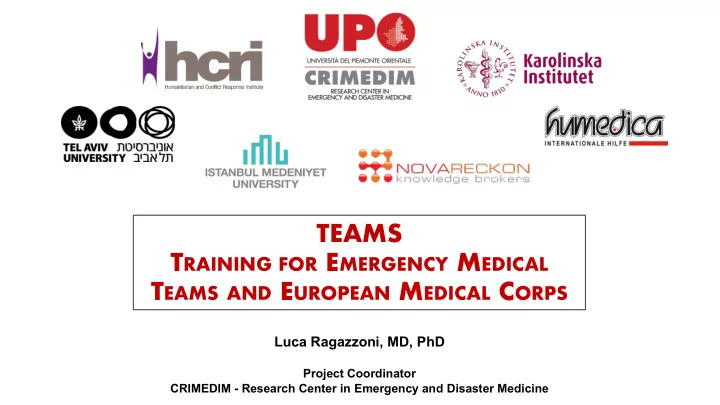

TEAMS T RAINING FOR E MERGENCY M EDICAL T EAMS AND E UROPEAN M EDICAL C ORPS Luca Ragazzoni, MD, PhD Project Coordinator CRIMEDIM - Research Center in Emergency and Disaster Medicine
Concerns regarding the standard of medical care provided and the lack of preparedness of health workers has been raised. Health practitioners have been observed to work outside their scope of practice and license , and teams have lacked basic capacities and logistic means to operate self- sufficiently. Additional concerns have been highlighted regarding the lack of cultural awareness and coordination with local authorities as well as international agencies.
The ‘Emergency Medical Teams’ (EMTs) initiative evolved in 2010 under the umbrella of the WHO, the Global Health Cluster and other actors, with the aim to improve the quality and accountability of international emergency medical teams responding to disasters. In 2013, the EMT Working Group published a first edition of the ‘Classification and minimum standards for Foreign Medical Teams in sudden onset disasters’ , in which capacities, services and minimum deployment standards for EMTs were defined.
EMT Competency Areas Amat Camacho N, Hughes A, Burkle FM, Ingrassia PL, Ragazzoni L, Redmond A, Norton I, von Schreeb J. Education and Training of Emergency Medical Teams: Recommendations for a Global Operational Learning Framework. PLoS Curr. 2016 Oct 21;8.
Objectives The overall objective is to develop, pilot and assess a standardized, validated and cost-effective training package, focused on operational team training for EMCs/EMTs , adaptable to different types of EMCs/EMTs, and sustainable within low-income countries and resource-poor settings. Specific aims: 1) To create a training framework focused on operational team training for EMCs/EMTs. 2) To develop teaching materials and identify effective training methods . 3) To implement a low-cost e-learning platform to facilitate the delivery of the teaching materials that is sustainable beyond the project. 4) To design a cost-effective set of simulation-based immersive scenarios for training EMCs/EMTs and facilitating quality assurance of these teams. 5) To pilot the overall training package through two main training events . 6) To assess the effectiveness of the training in terms of learning outcomes, participants’ satisfaction, improvement in technical and non-technical skills of the teams trained and cost-effectiveness. 7) To evaluate the quality of the training package.
Expected Result An open online training package consisting of innovative blended learning teaching materials and simulation-based exercises focused on operational team training, adaptable to different types of EMCs/EMTs, and sustainable for low- income countries and resource-poor settings. Beneficiaries All the EMC/EMT organizations, as well as universities, professional bodies and training agencies that are involved in EMC/EMT training as they look to comply with ECHO and WHO classification and minimum standards.
Methodology and Timeline 1. Analysis of situation and definition of training framework 2. Development of teaching materials and evaluation tools 3. Development of training tools and simulation scenarios 4. Pilot and assessment January December July March April October 2018 2017 2018
Sustainability and Continuation The online training package will be available free of charge after the end of the project to allow continuing access to and the usability of the teaching and training materials by the final beneficiaries all over the world. The online platform will be developed with a capacity to be easily accessible from all over the world and to be maintained with no cost over time . The consortium takes the responsibility for the quality assurance and evaluation mechanism of each training delivered by using the TEAMS training package through an online assessment methodology .
Thank you. CRIMEDIM Research Center in Emergency and Disaster Medicine Università del Piemonte Orientale Polo Formativo Professioni Sanitarie, Via Lanino 1, 28100 Novara, Italy | T. +39 0321 660620 https://crimedim.med.unipmn.it | https://www.facebook.com/crimedim | https://twitter.com/CRIMEDIM
Recommend
More recommend